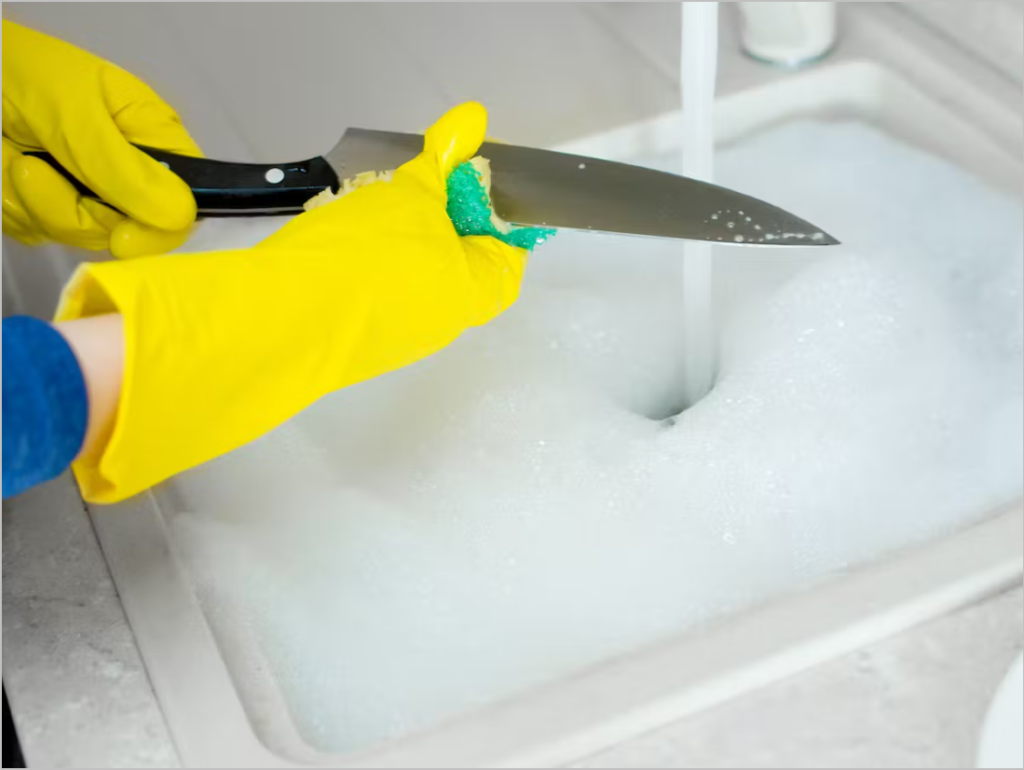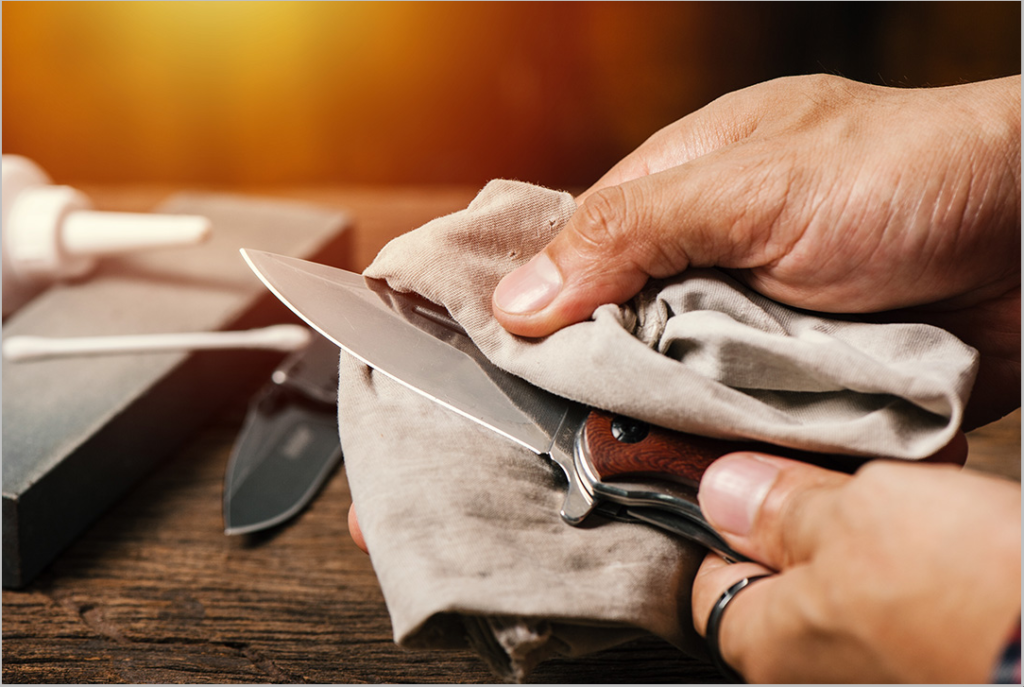Maintaining proper hygiene in food handling is crucial to prevent foodborne illnesses. Knives, being essential tools in food preparation, require meticulous cleaning and sanitization to ensure food safety.
When to Clean a Knife
Knives should be cleaned immediately after each use, even if they have only been used to cut non-food items. This is because food particles, bacteria, and other contaminants can accumulate on the blade and handle, potentially contaminating subsequent food items.
When to Sanitize a Knife
Sanitization is a more thorough process that involves killing bacteria and other microorganisms on the knife. It is required in the following situations:
- After cleaning a knife that has been used to cut raw meat, poultry, or fish
- After cleaning a knife that has been used to cut food that is not going to be cooked before consumption
- After cleaning a knife that has been dropped on the floor or other unsanitary surface
- After cleaning a knife that has been used by multiple people
Proper Cleaning and Sanitization Procedure
To effectively clean and sanitize a knife, follow these steps:
- Wash the knife thoroughly: Use hot, soapy water and a clean sponge or brush to remove all visible food particles and debris.
- Rinse the knife: Rinse the knife thoroughly with clean water to remove any remaining soap residue.
- Sanitize the knife: Submerge the knife in a sanitizing solution for the recommended amount of time. Common sanitizing solutions include bleach, quaternary ammonium compounds, and hydrogen peroxide.
- Rinse the knife again: Rinse the knife thoroughly with clean water to remove any residual sanitizing solution.
- Air dry the knife: Allow the knife to air dry completely before storing it.
Consequences of Improper Cleaning and Sanitization
Failure to properly clean and sanitize knives can have serious consequences, including:
- Foodborne illnesses: Contaminated knives can transfer bacteria to food, causing food poisoning.
- Cross-contamination: Using an unsanitized knife to cut different types of food can spread bacteria from one food to another.
- Reduced knife lifespan: Improper cleaning and sanitization can damage the knife’s blade and handle, shortening its lifespan.
By adhering to proper cleaning and sanitization practices, food handlers can ensure the safety of food and prevent the spread of foodborne illnesses.

When Must A Knife Be Cleaned And Sanitized Food Handlers
Maintaining proper hygiene in food handling is crucial to prevent foodborne illnesses. Knives, being essential tools in food preparation, require meticulous cleaning and sanitization to ensure food safety.
When to Clean a Knife
Knives should be cleaned immediately after each use, even if they have only been used to cut non-food items. This is because food particles, bacteria, and other contaminants can accumulate on the blade and handle, posing a risk of cross-contamination.
When to Sanitize a Knife
Sanitization is a more thorough process that involves killing bacteria and other microorganisms on the knife. It is required in the following situations:
- After cleaning a knife that has been used to cut raw meat, poultry, or fish
- After cleaning a knife that has been used to cut food that is not going to be cooked before consumption
- After cleaning a knife that has been dropped on the floor or other unsanitary surface
- At the end of each shift or day of use
Proper Cleaning and Sanitization Procedure
To effectively clean and sanitize a knife, follow these steps:
- Wash the knife thoroughly: Use hot, soapy water and a clean sponge or brush to remove all visible food particles and debris.
- Rinse the knife: Rinse the knife thoroughly with clean water to remove any remaining soap residue.
- Sanitize the knife: Submerge the knife in a sanitizing solution for the recommended amount of time. Common sanitizing solutions include bleach, quaternary ammonium compounds, and hydrogen peroxide.
- Rinse the knife again: Rinse the knife thoroughly with clean water to remove any residual sanitizer.
- Air dry the knife: Allow the knife to air dry completely before storing it.
Consequences of Improper Cleaning and Sanitization
Failure to properly clean and sanitize knives can lead to serious health risks. Bacteria and other microorganisms that accumulate on knives can contaminate food, causing foodborne illnesses such as Salmonella, E. coli, and Listeria. These illnesses can range from mild to severe, and in some cases, can even be fatal.
Conclusion
Maintaining proper hygiene in food handling is essential for ensuring the safety of consumers. Knives, being essential tools in food preparation, require meticulous cleaning and sanitization to prevent foodborne illnesses. By following the proper cleaning and sanitization procedures, food handlers can help protect the health of their customers and maintain a safe and sanitary food environment.

When Must A Knife Be Cleaned And Sanitized Quizlet
Maintaining proper hygiene in food handling is crucial to prevent foodborne illnesses. Knives, being essential tools in food preparation, require meticulous cleaning and sanitization to ensure food safety.
When to Clean a Knife
Knives should be cleaned immediately after each use, even if they have only been used to cut non-food items. This is because food particles, bacteria, and other contaminants can accumulate on the blade and handle, posing a risk of cross-contamination.
When to Sanitize a Knife
Sanitization is a more thorough process that involves killing bacteria and other microorganisms on the knife. It is required in the following situations:
- After cleaning a knife that has been used to cut raw meat, poultry, or fish
- After cleaning a knife that has been used to cut food that is not going to be cooked before consumption
- After cleaning a knife that has been dropped on the floor or other unsanitary surface
- After cleaning a knife that has been used by multiple people
Proper Cleaning and Sanitization Procedure
To effectively clean and sanitize a knife, follow these steps:
- Wash the knife thoroughly: Use hot, soapy water and a clean sponge or brush to remove all visible food particles and debris.
- Rinse the knife: Rinse the knife thoroughly with clean water to remove any remaining soap residue.
- Sanitize the knife: Submerge the knife in a sanitizing solution for the recommended amount of time. Common sanitizing solutions include bleach, quaternary ammonium compounds, and hydrogen peroxide.
- Rinse the knife again: Rinse the knife thoroughly with clean water to remove any residual sanitizing solution.
- Air dry the knife: Allow the knife to air dry completely before storing it.
Consequences of Improper Cleaning and Sanitization
Failure to properly clean and sanitize knives can lead to serious health risks. Bacteria and other microorganisms that accumulate on knives can cause foodborne illnesses such as Salmonella, E. coli, and Listeria. These illnesses can result in symptoms ranging from mild discomfort to life-threatening conditions. Click To Enlarge Blacklight Staff Cleaning Inspection Kit
Conclusion
Maintaining proper hygiene in food handling is essential for preventing foodborne illnesses. Knives, as essential tools in food preparation, require meticulous cleaning and sanitization to ensure food safety. By following the proper cleaning and sanitization procedures, food handlers can minimize the risk of cross-contamination and protect consumers from harmful bacteria.

When Must A Knife Be Cleaned And Sanitized Food Safety?
Maintaining proper hygiene in food handling is crucial to prevent foodborne illnesses. Knives, being essential tools in food preparation, require meticulous cleaning and sanitization to ensure food safety.
When to Clean a Knife
Knives should be cleaned immediately after each use, even if they have only been used to cut non-food items. This is because food particles, bacteria, and other contaminants can accumulate on the blade and handle, posing a risk of cross-contamination.
When to Sanitize a Knife
Sanitization is a more thorough process that involves killing bacteria and other microorganisms on the knife. It is required in the following situations:
- After cleaning a knife that has been used to cut raw meat, poultry, or fish
- After cleaning a knife that has been used to cut food that is not going to be cooked before consumption
- After cleaning a knife that has been dropped on the floor or other unsanitary surface
- After cleaning a knife that has been used by multiple people
Proper Cleaning and Sanitization Procedure
To effectively clean and sanitize a knife, follow these steps:
- Wash the knife thoroughly: Use hot, soapy water and a clean sponge or brush to remove all visible food particles and debris.
- Rinse the knife: Rinse the knife thoroughly with clean water to remove any remaining soap residue.
- Sanitize the knife: Submerge the knife in a sanitizing solution for the recommended amount of time. Common sanitizing solutions include bleach, quaternary ammonium compounds, and hydrogen peroxide.
- Rinse the knife again: Rinse the knife thoroughly with clean water to remove any residual sanitizing solution.
- Air dry the knife: Allow the knife to air dry completely before storing it.
Consequences of Improper Cleaning and Sanitization
Failure to properly clean and sanitize knives can lead to serious health risks. Bacteria and other microorganisms that accumulate on knives can cause foodborne illnesses such as Salmonella, E. coli, and Listeria. These illnesses can result in symptoms ranging from mild discomfort to life-threatening conditions. Zep Cherry Bomb Hand Cleaner: Powerful Cleaning for Tough Messes
Conclusion
Maintaining proper hygiene in food handling is essential for preventing foodborne illnesses. Knives, as essential tools in food preparation, require meticulous cleaning and sanitization to ensure food safety. By following the proper cleaning and sanitization procedures, food handlers can minimize the risk of cross-contamination and protect consumers from harmful bacteria.
When Must A Knife Be Cleaned And Sanitize?
Maintaining proper hygiene in food handling is crucial to prevent foodborne illnesses. Knives, being essential tools in food preparation, require meticulous cleaning and sanitization to ensure food safety.
When to Clean a Knife
Knives should be cleaned immediately after each use, even if they have only been used to cut non-food items. This is because food particles, bacteria, and other contaminants can accumulate on the blade and handle, posing a risk of cross-contamination.
When to Sanitize a Knife
Sanitization is a more thorough process that involves killing bacteria and other microorganisms on the knife. It is required in the following situations:
- After cleaning a knife that has been used to cut raw meat, poultry, or fish
- After cleaning a knife that has been used to cut food that is not going to be cooked before consumption
- After cleaning a knife that has been dropped on the floor or other unsanitary surface
- After cleaning a knife that has been used by multiple people
Proper Cleaning and Sanitization Procedure
To effectively clean and sanitize a knife, follow these steps:
- Wash the knife thoroughly: Use hot, soapy water and a clean sponge or brush to remove all visible food particles and debris.
- Rinse the knife: Rinse the knife thoroughly with clean water to remove any remaining soap residue.
- Sanitize the knife: Submerge the knife in a sanitizing solution for the recommended amount of time. Common sanitizing solutions include bleach, quaternary ammonium compounds, and hydrogen peroxide.
- Rinse the knife again: Rinse the knife thoroughly with clean water to remove any residual sanitizing solution.
- Air dry the knife: Allow the knife to air dry completely before storing it.
Consequences of Improper Cleaning and Sanitization
Failure to properly clean and sanitize knives can lead to serious health risks. Bacteria and other microorganisms that accumulate on knives can cause foodborne illnesses such as Salmonella, E. coli, and Listeria. These illnesses can result in symptoms ranging from mild discomfort to life-threatening conditions.
Conclusion
Maintaining proper hygiene in food handling is essential for preventing foodborne illnesses. Knives, as essential tools in food preparation, require meticulous cleaning and sanitization to ensure food safety. By following the proper cleaning and sanitization procedures, food handlers can minimize the risk of cross-contamination and protect consumers from harmful bacteria.
Q&A
When Must A Knife Be Cleaned And Sanitized?
After each use
When Must A Knife Be Cleaned And Sanitized Food Handlers?
Before and after each use
When Must A Knife Be Cleaned And Sanitized Quizlet?
After each use
When Must A Knife Be Cleaned And Sanitized Food Safety?
After each use
When Must A Knife Be Cleaned And Sanitize?
After each use





